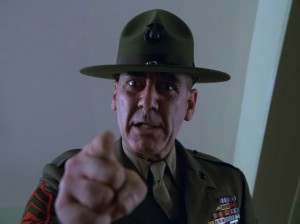 Here’s a Sunday Suggestion for you: pay attention to the cadence of your story when you write. I’ve said it before: there’s not as large a gap between literature and music as one might think. Oh I know, whenever I say that a couple of neanderthals crawl out of their caves, grunt, laugh, and wonder at how any sane writer can possibly compare writing to song. (Actually it’s more like a scratching of the underdeveloped skull and a tilting of the head—“wonder” gives these shortsighted folk too much credit).
Here’s a Sunday Suggestion for you: pay attention to the cadence of your story when you write. I’ve said it before: there’s not as large a gap between literature and music as one might think. Oh I know, whenever I say that a couple of neanderthals crawl out of their caves, grunt, laugh, and wonder at how any sane writer can possibly compare writing to song. (Actually it’s more like a scratching of the underdeveloped skull and a tilting of the head—“wonder” gives these shortsighted folk too much credit).
Heck, the military has been using cadence for centuries. If it can make a fifteen-mile bivouac half-tolerable, just think what it might do for your story.
I’m not sure but it’s been said,
Shitty writers write with lead.
Yeah that’s true, but I’ve been told,
Write with song you’ll write like gold.
All kidding (and my own little ditty) aside, great writing has many of the elements of music: tempo, cadence, crescendo, diminuendo, a beat, etc. In fact, in screenwriting a “beat” means a pause before speaking.
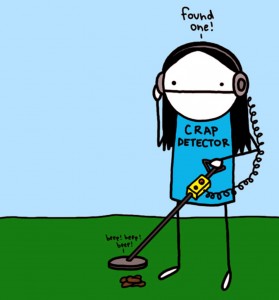 For some reason I woke up this morning thinking about the terrible writing I have witnessed recently. I download samples quite frequently, particularly from other Indie writers, because I want to know what’s out there. How are we doing as a collective?
For some reason I woke up this morning thinking about the terrible writing I have witnessed recently. I download samples quite frequently, particularly from other Indie writers, because I want to know what’s out there. How are we doing as a collective?
The news is not as bright as I’d like it to be. In fact, as a bunch, we’re beyond rotten. If the collective of Indie books I’ve sampled recently were a bunch of bananas, a starved monkey wouldn’t give it a second glance. He’d eat his own feces first. Seriously.
So I’ve decided to devote more of my blog time to suggesting ideas for improving one’s writing than worry about book rankings, marketing tools, promotional magic, and anything else related to selling more books. Except for writing better books, that is. Don’t worry. I’m not going to stop sharing whatever it is I think I’ve learned out there in the marketing war. If I find a field full of land mines or an easier way to scale a particular cliff, I promise, I’ll share. But I think it’s high time we writers thought more about the collective quality of our writing than the best way to pimp a sale.
 Back to cadence. I am telling you, short of detonating 98% of the adverbs in your text, I’m not sure there’s anything that can improve your prose more than paying attention to the way your writing flows. I do think some of the ability to hear how your writing flows is actually somewhat innate (in other words, I think some people just feel it easier than others—just like some people can feel the music and beat and others dance like broken scarecrows). The good news is, I believe pace and flow and beat can be learned. Just as a person can learn to dance better (please DON’T think “Footloose” but if you do, think of the late Chris Penn, not Miles Teller in the 2011 remake that should never have been done).
Back to cadence. I am telling you, short of detonating 98% of the adverbs in your text, I’m not sure there’s anything that can improve your prose more than paying attention to the way your writing flows. I do think some of the ability to hear how your writing flows is actually somewhat innate (in other words, I think some people just feel it easier than others—just like some people can feel the music and beat and others dance like broken scarecrows). The good news is, I believe pace and flow and beat can be learned. Just as a person can learn to dance better (please DON’T think “Footloose” but if you do, think of the late Chris Penn, not Miles Teller in the 2011 remake that should never have been done).
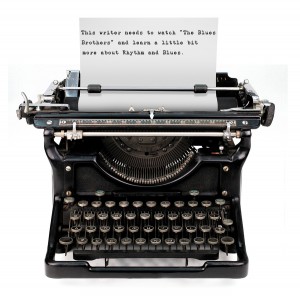 The point is, your writing must have a flow. Too much of the crap I read is not unlike someone ate a dictionary and barfed words all over the page. Seventeen words, period. Eighteen words, period. Sixteen words with way too many adverbs, period.
The point is, your writing must have a flow. Too much of the crap I read is not unlike someone ate a dictionary and barfed words all over the page. Seventeen words, period. Eighteen words, period. Sixteen words with way too many adverbs, period.
New paragraph.
The words read like an old typewriter used to sound. Tap, tap, tap, tap, CLING. Return. Tap, tap, tap, tap, CLING. Return.
Seriously.
Let me ask you this: as an author, do you ever read your words aloud to yourself? I do. Well, I actually hear them in my head. When I read the words (mine or others) I hear what it sounds like to read them. No, I’m not special. I just do. I also hear music in my head. Trust me, it’s not always roses; when I get a song stuck in my head, I really get a song STUCK in my head. It’s excruciating. But however you do it, you need to HEAR how your words read.
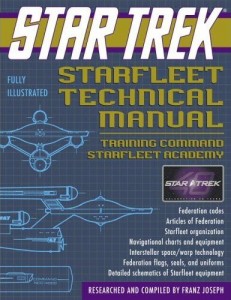 And here’s a little secret: want to know exactly how you don’t want your writing to “sound”? Just go find a textbook. Any textbook will do. Or the technical manual that came with your new trackball or wireless router. You’d be shocked at how many novels read with the identical flow of some writer trying to tell you how to program the IP address and subnet mask into their new home WI-FI hotspot.
And here’s a little secret: want to know exactly how you don’t want your writing to “sound”? Just go find a textbook. Any textbook will do. Or the technical manual that came with your new trackball or wireless router. You’d be shocked at how many novels read with the identical flow of some writer trying to tell you how to program the IP address and subnet mask into their new home WI-FI hotspot.
Unfortunately there’s no magical solution to offer up that will suddenly make your prose brilliantly transformed. The best advice I’ve come up with is to look at your writing as a whole, on the page. Are all the sentences about the same length? Paragraphs all roughly the same size? Does your dialogue look like paragraphs or a screenplay? (If you’ve never read a screenplay to help improve your dialogue, do so—NOW) Have any two-word sentences? One?
People, a novel isn’t a textbook. I’m not saying your hard-boiled Mystery has to sound like Emily Dickinson or Mozart. But I am saying that I believe that’s where all great writing originates.
Now I thought and thought this morning how to get my point across and then, an epiphany. It’s actually so simple (for me) that I’m amazed it wasn’t looming around my frontal lobe all morning while writing this piece. My favorite book of all time is Heart of Darkness, by Joseph Conrad. A friend gave me a trade paperback version of it twenty years ago and told me it was the greatest book ever written. Here’s the twist:
I never read it. I tossed it aside into my “yeah, one day I’ll get to these books” pile and now I couldn’t tell you where it is.
I’ve still never read it cover-to-cover. But I have listened to it at least twenty times over. I mean LITERALLY listened to it. Several years ago I bought it as a “book on tape” (it was the MP3 version from audible.com, I believe). The point is, to listen to this book, by this particular narrator, is to know what all writing should sound like. Heart of Darkness, if you haven’t read it, is no fairytale. The movie Apocalypse Now was based on the text, though a bit loosely if you ask me. The point here is that such a poetic flow is not necessarily to imply some kind of paranormal romantic lovemaking. You can write wonderfully about death. You can make torture sound downright pleasing to the ear.
Here is my challenge to each of you: go out and buy the audio version of Heart of Darkness I am about to share with you. And buy this one. I’ve listened to others over the years, and I’ve never heard one read so perfectly. I have no doubt Conrad would agree.
Listen to it in the car. On the treadmill. Walking the dog.
It will improve you as a writer, I swear to you. The funny thing is, you really don’t even have to worry about the genre. Oh, I don’t LIKE stories about this or that. Don’t worry. Just listen as if you were playing chamber music. Honestly the first time I listened to it, had I not already known the plot, I might have gotten so lost in the flow and cadence and beauty of the story that I would have missed it. That’s not to say it isn’t a great story. It’s a classic. A SUPERB tale. Chilling, actually.
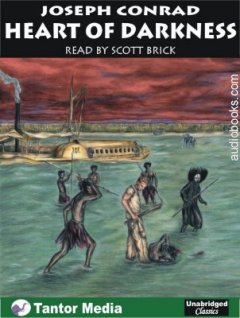 Here are two links to the exact version to which I am referring (narrated by Scott Brick; IMO, that’s the key):
Here are two links to the exact version to which I am referring (narrated by Scott Brick; IMO, that’s the key):
Audible.com
The Audio Book Mart (which may just take you back to Audible.com anyway)
Here’s a little sample for those of you who are still skeptical: click here.
As to your own writing: listen. Look at the composition of the words on your page. Read your prose aloud. Break up sentences. Fragment. Expound for a while and be unafraid of the long (even run-on worthy) sentence for it may be your best tool in conveying the emotion, depth, candor, gravity, or volatility of the moment. Then shorten up again. The beauty of writing fiction is that the song is yours to compose. Only you know its final ending. How each note titillates the next.
FYI: several years ago the text of Conrad’s masterful condemnation of imperialism was converted to Kindle format by a community of volunteers and is FREE.
Enjoy.
Listen.
And WRITE.



I am always thrilled to read your blog, but not more so than when I find you taking us back to the roots of our craft. A really great blog, Rob. You remind me that our love for music is never more evident than when we can hear it within the words on the written page.
From a writing teacher perspective, one of the best things I’ve done is teach poetry.
When revising drafts of poetry and when analyzing poetry, I encourage students to consider musical tools such as onomatopeia, alliteration, and more. Poetry lessons also encourages students to embrace brevity.
When musical tools and brevity from poetry transfer to prose, writing improves – it becomes audible.
Great post, Rob. I heard the cadence of your ditty in my mind. And you’re right about beats in screenwriting; at UCLA they taught us to write a beat sheet in order to read the script in terms of its emotional beats.
I would like to add that in order to write, ONE MUST MUST MUST read. I’m often shocked by new writers (or people who say they want to write) who when asked what they’re reading reply that they don’t have time to read. That’s like Michael Phelps saying he doesn’t have time to swim. We learn to write through reading, writing, and reading and writing some more. Practice makes perfect. That’s the only secret.
Thanks, Ryan. And I could not agree MORE. There is nothing more important to the writing process (setting aside the actual writing) as READING. In fact, when I am a full-time writer, the first part of my work day will always be READING. It’s as much a part of the creation process as the craft itself. Bravo once again for such a magnificent point. Together we could be dangerous. 🙂
You have crystalized several ideas I’ve been trying to form into words for some time, Rob. I wanted to write a blog post on which writers appeal to me, and which do not. I was then trying to find what elements of style writers like Scott Morgan, Ben Wretlind and you share; it’s hard to put into words, but it may be beat.
On the other hand, I can’t agree with your choice of a great example. I, too, had Heart of Darkness on my “must read one of these days” list until my son had to read it for school. When I read it, I found the whole book flowed like Conrad’s opening description of the still, glassy, greasy Thames. Short as it was, I found the book a slow, almost tortuous read. Maybe I’ll give it another chance, or listen to it read, as you did.
Other than Conrad, which writers do you feel have a good rhythm to their writing? In addition to the three I mentioned, I really like John Updike, John Irving, Chuck Palahniuk, Mark Helprin, Michael Ondaatje and Yann Martel.
I can’t say I have found that flow in any of the big hit writers, like Dan Brown, JK Rowling or Stieg Larsson. Do they lack rhythm?
Thanks, Scott. I am left, however, feeling like I need to point out that I very intentionally used the example of Scott Brick’s narrative of Heart of Darkness as the example of rhythm and pace and flow, not necessarily Conrad as the writer himself. Fair enough, though, because I did not offer up any examples. I’d say my number one example might be Hunter S. Thompson. Also Thom Jones. That MoFo will rock your world with his flow. Perhaps the best contemporary master for me is Cormac McCarthy. If you’ve never read Jonathan Lethem, oh boy does he get it.
And to answer your question on Brown, Rowling, and Larsson. Yes, I think they lack rhythm. And I’ll leave it at that. 😉
I am coming to believe there are people who want to write books and people who want to develop themselves as writers. Those we’ll remember as authors are in the second group.
Well said Rob! I totally agree. I am more of a reader than a writer. In fact, I am reading an as-of-yet unfinished, but soon to be published novel–and I am struck by the ‘musicality’ and ‘orchestration’ of the words–something I am always impressed by. These are words often used to critique poetry, but they apply to prose as well.
Nice blog! Glad I found it. Mindy (Seattle Wa)
Thanks, Mindy! Will check yours as well! 🙂